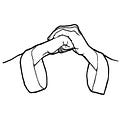I recently got together with old friends, shooting some video for their respective Nine Dragon Baguazhang schools. (Toronto and Hamilton in Ontario, Canada)
I had not seen these men in a few years and it was as if no time had passed since we were last together. Yes, there are a few more gray hairs but the spirit of friendship was as strong as it ever was.
Friendship is a simple idea that we often take for granted. So much so that mere acquaintances who are nice to us are now considered friends and on places like Facebook a “friend” is anyone we accept as such simply because they are “friends” with someone else. To say the concept has been diluted is to minimize the damage to it.
I remember coming to internal arts and specifically Baguazhang. At first the sense of being alone in a vast mysterious landscape was palpable. Here was a tradition about which I knew little, and I could sense its depth of knowledge. It felt like diving into a vast ocean with no idea what was beneath the surface.
Making friends in the training was my saving grace. We compared experiences, discoveries, and information. We encouraged each other, challenged each other, asked questions, laughed, struggled, and simply learned together.
There were endless discussions and stories to share, all while learning a unique set of skills that none of us hoped to ever have to use outside the training. Nine Dragon Baguazhang is not a tournament art aimed at getting a trophy. It is aimed at surviving in combat.
Among the most important moments in our regular practice was just before engaging with a partner. We would bow to each other with the fist-in-palm salute,
The more experienced student would say, “Friendship first, competition second” to which the less experienced student would respond, “I will learn from you.” This was no mere courtesy or pedagogical requirement. It was integral to the function of the exercises.
If one became competitive in a particular practice, the lessons inherent in it would vanish almost immediately. This is because one of the primary skills, especially in internal arts, are what are known as listening skills. This is the ability to feel the intention of one’s practice partners through their movements.
When trying to “win” in a practice game, the ability to listen is among the first things to disappear. It is replaced with aggression, strategy, trickery, etc. The urge to win dominates the urge to learn.
So evoking “friendship first” is a step towards overcoming the urge to win. And herein lies the key to valuing friendship in martial arts training. When that urge to win is put aside for sake of learning, a unique sense of trust starts to build. This trust is possibly one of the most important aspects of learning with partners.
When facing a partner to practice applying a technique or principle, it is crucial that there be trust between the participants. The risk of injury is real in many scenarios and if one does not trust a partner to act as expected, the skill will not be learned correctly. Remember, the goal is always to acquire survival skills for the real world.
Finally, the deepest value of friendship is that simple one of not feeling alone. Being part of a martial arts family is a unique connection with other people dealing as it does with survival skills, potentially those of harm or worse.
So when I gathered with old friends it felt like I’d come home to a family gathering.
My heartfelt thanks to my friends.🙏




